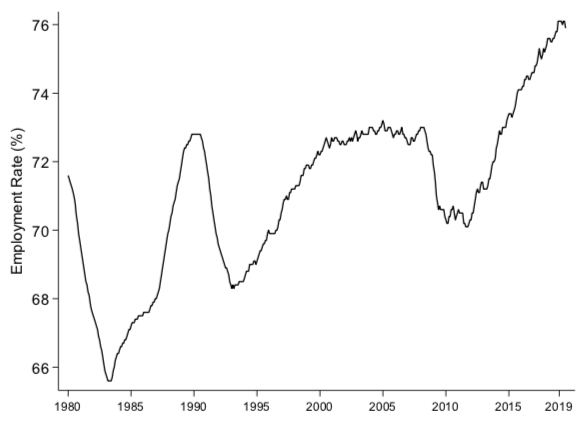
The UK labour market, at first glance, seems to be playing at Dr Jekyll and Mr Hyde. Employment (in terms of both levels and rates) is at record highs, yet wage growth has been extraordinarily weak. One view is that these are opposite sides of the same coin. Another, more nuanced standpoint is that record employment is hiding a number of serious concerns about the changing composition of work as poor quality jobs, often with little employment protection, have permeated the labour market.
We call for tax reforms and for the “increasingly hazy” distinction between who is an employee and who is self-employed to be clarified and addressed.
Our analysis of the labour market concludes that:
- UK employment growth has been strong in the last few years, reflecting a jobs boom, with employment and unemployment rates respectively at record highs and lows.
Figure 1. Employment rate in the UK, 1980-2019

Source: ONS employment series.
- But at the same time, wage growth has been extremely weak with real wages stagnating or falling for most workers since the late 2000s. Low wage workers have done better due to mandated minimum wage increases outpacing inflation.
- The UK’s recent wage growth compares poorly internationally. Out of 34 OECD countries, only Greece experienced lower real wage growth between 2007 and 2018.
Figure 2. International average real wage growth, 2007-2018

Notes: Average real wages defined by the ratio between total wage bill and average hours worked. Source:OECD Stats, 2019 (https://stats.oecd.org/).
- The low measured unemployment rate masks that labour market slack is higher than it suggests as average hours have fallen and under-employment has risen.
- Solo self-employment has risen very sharply and is the main source of jobs growth in the UK labour market.
- Insecure employment is on the rise via more low wage positions, including zero hours contracts and new forms of alternative work arrangements (frequently being experienced by the solo self-employed).
- Key policy options for discussion include: proposed sizable increases in minimum wages; the tax and social insurance treatment of the solo self-employed; and the need for productivity to increase to get wages up across the board.
The labour market may seem to be at peak fitness, as employment rates continue at record highs – but it is not in as good shape as some assert. Employment growth has been strong, but there are serious concerns about the changing nature of work and low (sometimes very low) wages.
In real terms, median weekly wages have still not recovered to the 2008 pre-recession level. The consistent real wage growth experienced in the pre-crisis period looks now a distant reality. The extended period of low wage growth is unprecedented in modern times.
In the long run, the key driver of wages is productivity. For all workers to get pay increases, and for all to have decent living standards, productivity needs to improve through investment in skills, innovation and human resources policies.”
The UK labour market is playing at Dr Jekyll and Mr Hyde – there are record high levels of employment and extraordinarily weak wage growth.
The rise of the gig economy and other alternative work arrangements has led to discussions about the trade-off between additional flexibility they can offer and the emergence of low-wage, dead end jobs that function outside the job legislation offered in conventional employment and promise little in the way of career development and wage progression.
The distinction between who is an employee and who is self-employed needs to be addressed in terms of tax treatment inequalities, together with whether (and how) social insurance benefits could be extended beyond those in traditional employment to offer a safety net to those in low-wage, precarious work.
♣♣♣
- This blog post is a version of the press release issued by LSE’s Centre for Economic Performance (CEP). It is based on CEP election analysis: The Labour Market, one in a series of election briefings. The series aims to provide an impartial, evidence-based analysis of the key issues in the 2019 UK general election including education, social mobility, immigration, Brexit and regional policy.
- The post gives the views of its author(s), not the position of LSE Business Review or the London School of Economics.
- Featured image via the US Library of Congress, public domain.
- When you leave a comment, you’re agreeing to our Comment Policy






1 Comments